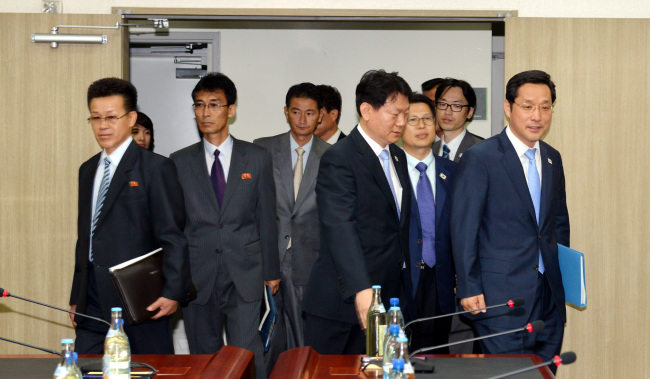GAESEONG, North Korea ― The two Koreas on Thursday held their first talks in six months over a joint factory park in the North amid their strained relations over concerns about Pyongyang’s nuclear test and stringent criticism against Seoul and Washington.
The meeting of a joint committee tasked with the operation of the Gaeseong industrial complex took place in the North Korean border city. It was led by Lee Kang-woo, cochair of the panel and director general for inter-Korean cooperation district support at Seoul’s Unification Ministry, and his counterpart Park Chol-su, vice director of the General Bureau of the Special Zone Development Guidance.
The delegates were expected to explore ways to improve the passage system and Internet services, and to set up an arbitration body in line with their agreement in August that reopened the business district after a five-month freeze.
As the negotiations kicked off, Lee said the two sides faced a “long road ahead,” expressing hopes for progress on the agenda.
“Let’s begin today’s meeting with big hopes that it will provide a good chance to develop and nurture the industrial district,” Park said in response.
The meeting of a joint committee tasked with the operation of the Gaeseong industrial complex took place in the North Korean border city. It was led by Lee Kang-woo, cochair of the panel and director general for inter-Korean cooperation district support at Seoul’s Unification Ministry, and his counterpart Park Chol-su, vice director of the General Bureau of the Special Zone Development Guidance.
The delegates were expected to explore ways to improve the passage system and Internet services, and to set up an arbitration body in line with their agreement in August that reopened the business district after a five-month freeze.
As the negotiations kicked off, Lee said the two sides faced a “long road ahead,” expressing hopes for progress on the agenda.
“Let’s begin today’s meeting with big hopes that it will provide a good chance to develop and nurture the industrial district,” Park said in response.

Lee was expected to push for a full-scale expansion of an electronic identification system launched in January for a six-month test run.
The radio frequency identification system ensures a faster and easier immigration procedure by allowing South Korean workers to scan their ID cards embedded with an electronic chip instead of having their names checked against a list made three days in advance.
The new method, along with Internet and mobile phone services, was a centerpiece of the August deal. But the North has displayed reluctance toward its implementation, especially since Seoul and Washington ran their annual military drills in February.
Park, for his part, may demand a wage hike, tax payment and other issues of its interest.
“I will make my utmost efforts particularly to resolve the passage, communications and customs issues such as adopting a registration-free entry system and the Internet service, which were agreed on last year but not yet implemented,” Lee told reporters before leaving for Gaeseong.
The talks raised hopes of a turnaround in cross-border relations frayed by the communist regime’s persistent nuclear threats and verbal attacks on South Korea and the U.S.
They coincided with another meeting in Gaeseong of civic groups from the two Koreas ― Green One Korea and the North’s Council for National Reconciliation ― to discuss cooperation on forestation and pest control in the impoverished country.
On Thursday, a separate inter-Korean panel in charge of compiling a joint dictionary also met in the border town.
In May, Pyongyang said it would join this year’s Asian Games in the South Korean port city of Incheon.
“There has been a slight change in North Korea’s attitude over the last two to three weeks,” Ju Chul-ki, senior presidential secretary for foreign affairs and security, told a business forum on Jejudo Island earlier in the day, citing the talks of the Gaeseong complex joint committee and humanitarian program.
“We will strive to close the sense of cultural, emotional difference between the two Koreas such as by resuming the unified dictionary project, and discuss ways to hand over our experience in economic education, global finance, special economic zones and small and medium businesses essential for North Korea.”
By Shin Hyon-hee, Joint Press Corps
(heeshin@heraldcorp.com)










![[Hello India] Hyundai Motor vows to boost 'clean mobility' in India](http://res.heraldm.com/phpwas/restmb_idxmake.php?idx=644&simg=/content/image/2024/04/25/20240425050672_0.jpg&u=)








